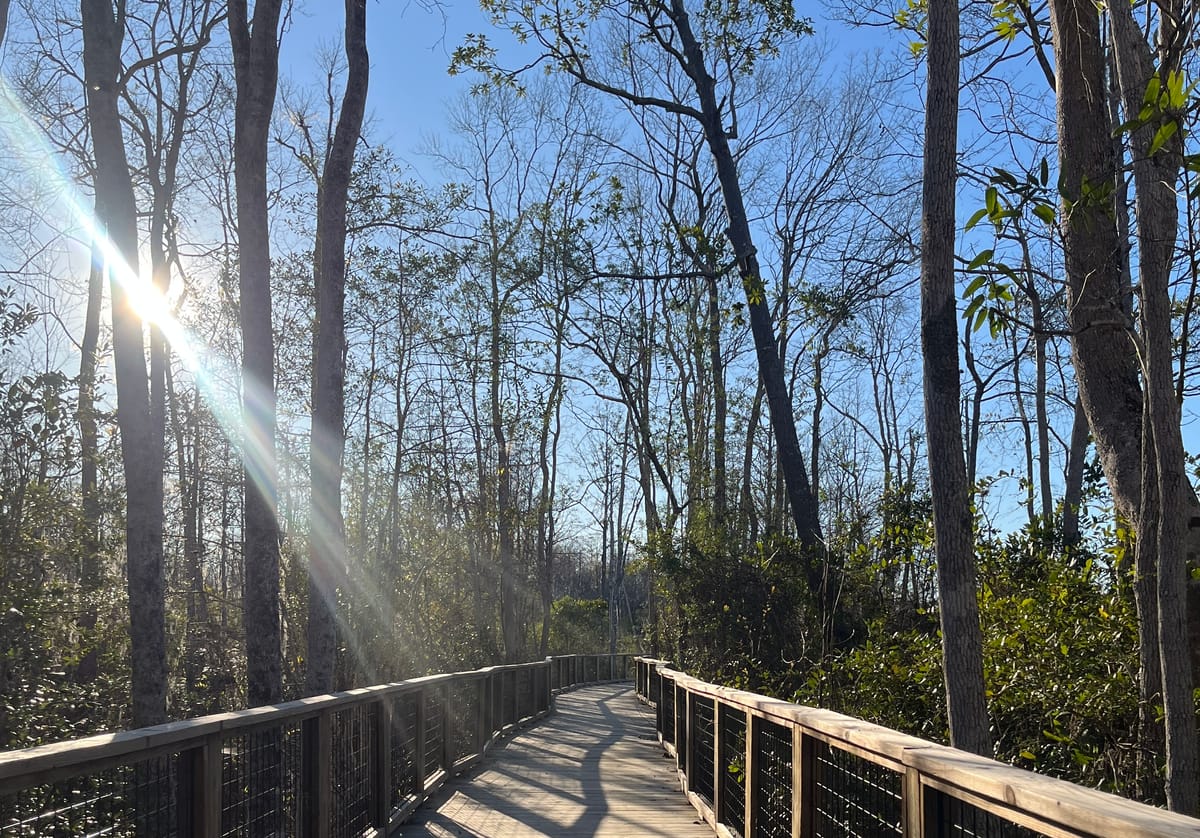It's time to 'touch grass'

Hi friends,
I’m not sure if y’all are hip to the slang “touch grass,” but essentially, that’s what the kids are saying when they feel like a person needs to go outside and spend time in the real world—away from their online activities and constant phone notifications.
For the past couple of weeks, I’ve felt a strong need to disconnect from the vortex that is the internet (and our political news cycle) and to very literally touch some grass. I recently visited the country’s largest blackwater swamp (see this week’s picture), spent time on the Gulf Coast where I’m from, and lounged in my backyard with my chickens and cats. I love spring time—probably because I can feel the weight of seasonal affective disorder becoming a hazy memory and because I revel in the signs of rebirth and growth. Needless to say, I’ve been answering the call to spend time outside and soak up sunshine like a sponge.
In the poetry world, writers referred to as “nature poets” are often both beloved and highly criticized. Sadly, some folks don’t take these poets or their craft seriously; their notion is that leaning on nature for metaphor or setting is somehow lazy or sentimental. But I’ll tell you right now, I’m definitely not one of those people. So today, I want to share a few “nature poems” that I think provide the perfect backdrop for revealing deeper truths about humanity and our connection to the world we live in. Hopefully, they will also inspire you to get outside and touch some grass.
I was first introduced to the works of James Wright during college and was immediately drawn to both his use of the natural world as well as his frequently compelling final lines. In my opinion, there are few poets who know how to end a poem with more flair than Wright. I hope you’ll take a moment to read “A Blessing” and “Lying in a Hammock at William Duffy’s Farm in Pine Island, Minnesota” to see what I mean.
Although Lucille Clifton’s work is more well known for its thematic focus on race, gender, and the Black experience in America, she often uses natural settings as a way to hammer her point home. You wouldn’t necessarily expect a poem called “poem in praise of menstruation” to be a nature poem per se, but somehow, it is that and much more. Meanwhile, “the earth is a living thing” begins with a striking, zoomed out image of a landscape, but the reader ends up somewhere very different and yet so intimately related.
To me, you can’t mention nature poets without talking about the queen of them—Mary Oliver. A few of Oliver’s poems have made the rounds on Instagram over the last few years, the most famous of which is probably The Summer Day. But I’m here to assert that there is so much more to her body of work than a couple of memorable lines.
Mary’s life story began as a very sad one—suffering trauma and abuse at the hand of her father. In a profound interview with podcaster Krista Tippett, though, Oliver shared that the beauty of the world saved her life and explained how she escaped the chaos in her home by spending hours walking through the woods that surrounded it. Her habit of exploring, observing, and then recording what she saw became a practice that Oliver literally never stopped doing and one that transformed into a poetic practice as well.
Oliver was very prolific across her lifetime, so selecting a couple of poems to show the breadth of her work is challenging to say the least. After brainstorming some options, I decided to use the concept of the Enneagram to share nine very beautiful, but very different poems with you. I’ve chosen these poems based on thematics that I think would be impactful for each number, so if you know yours, I hope you’ll check out the corresponding poem. If you’re unfamiliar with the Enneagram, I am afraid that’s a longer chat for another day, but I encourage you to pick a poem or two at random and enjoy them anyways. All nine poems are a joy, though.
One - Sunrise
Two - The Journey
Three - The Sun
Four - The Uses of Sorrow
Five - Daisies
Six - I Worried
Seven - When Death Comes
Eight - I Ask Percy How I Should Live My Life
Nine - What I Have Learned So Far
